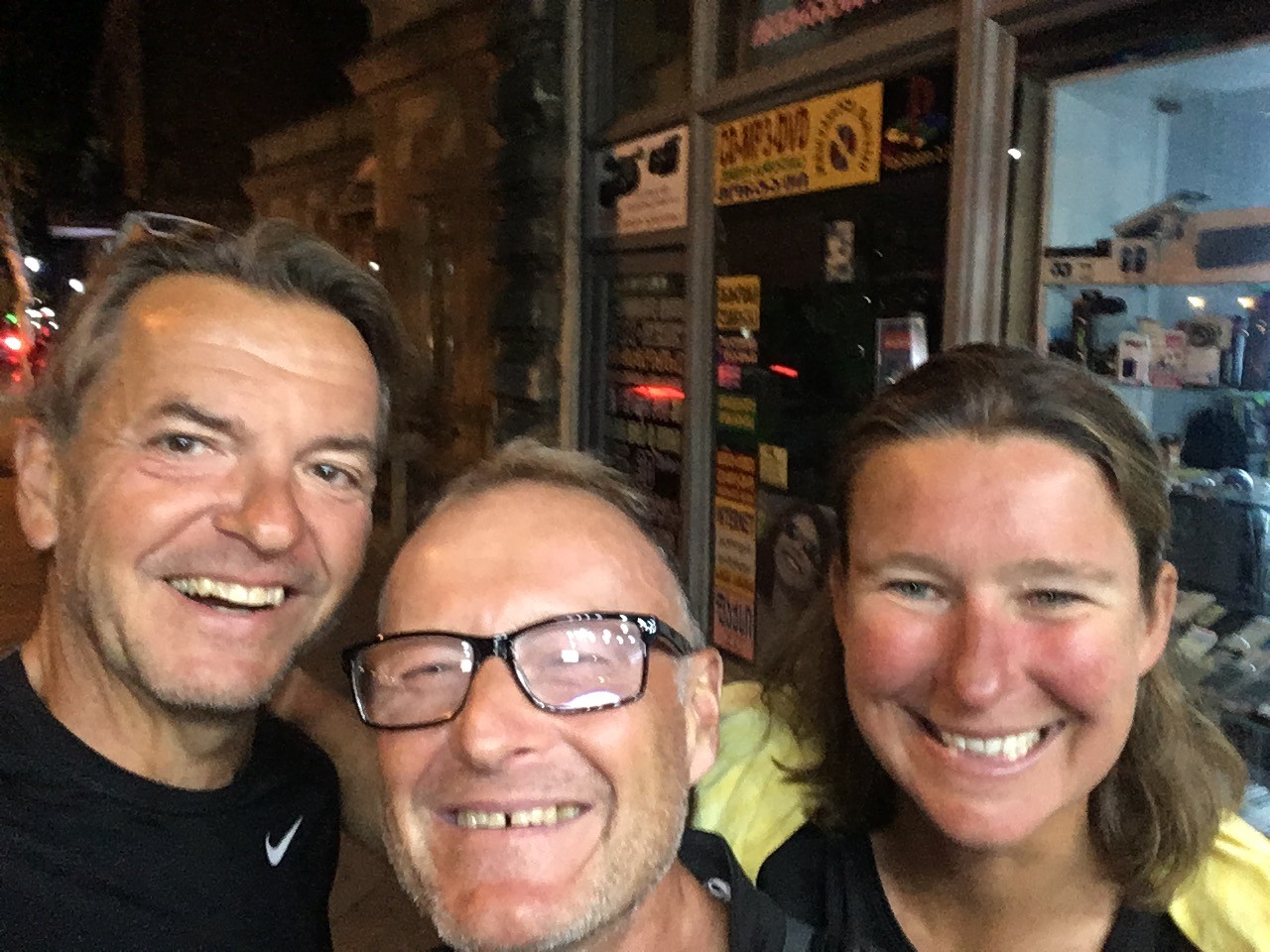Published at October 19, 2018 at 9:00 PM
Published at October 19, 2018 at 9:00 PM
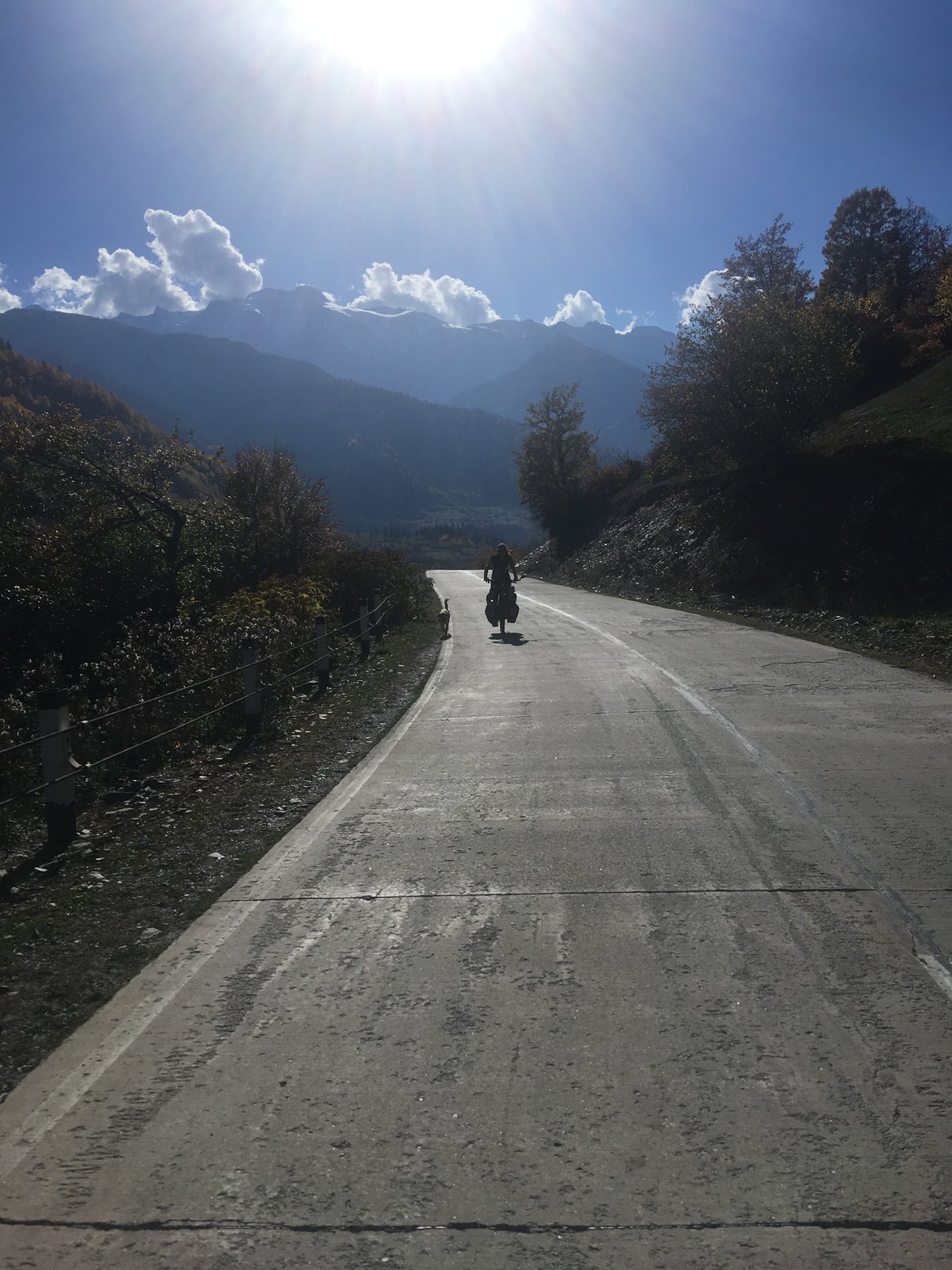
From Kutaisi we cycle to Zugdidi. At least that was the plan. We did not make it. After a very simple and flat first half ,where we share the road with pigs, cows, geese and horses, we turn off the main road into the hills.
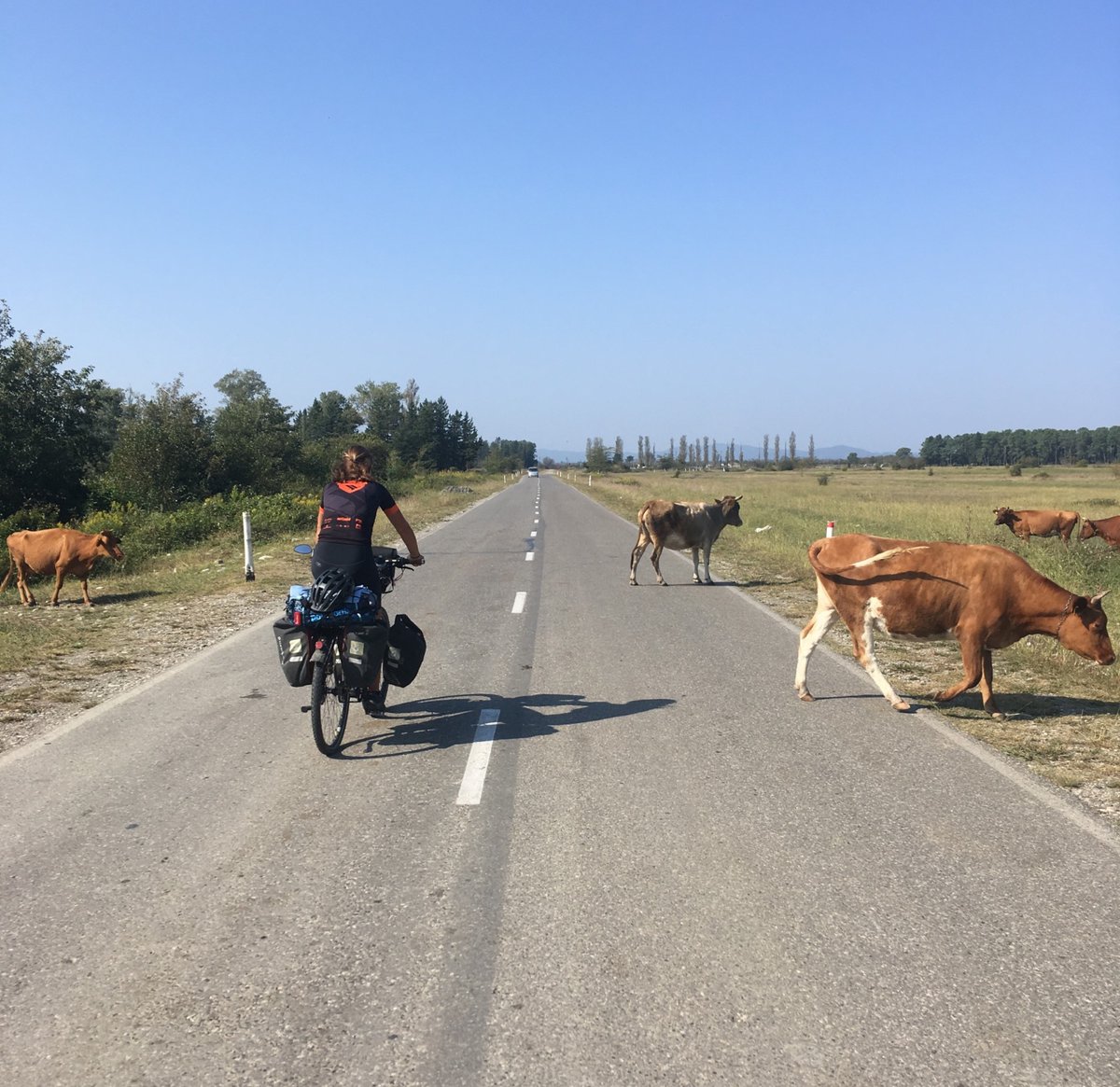
The road turns into a a gravel road, into a cart track and then into a cow path. A peasant couple comes to us to warn us: ‘The road to Zugdidi will become a problem. Maybe not impossible but difficult ‘. We decide to continue, but soon we struggle through the mud until we face a brook. Ok we see a cows track steeply rising on the other side of the stream, but it certainly is impossible to cycle even on a MTB. It will be hard to get to the other side. Is there anyway a (cows) path on the other side? Will we attempt to cross or is it better go back? Back is not an option either, so Roelie pulls her shoes off. The mud slurps and sometimes she drops to the calves into it but once on the other side there is a kind of trail. It takes all in all an hour to get to the other side.
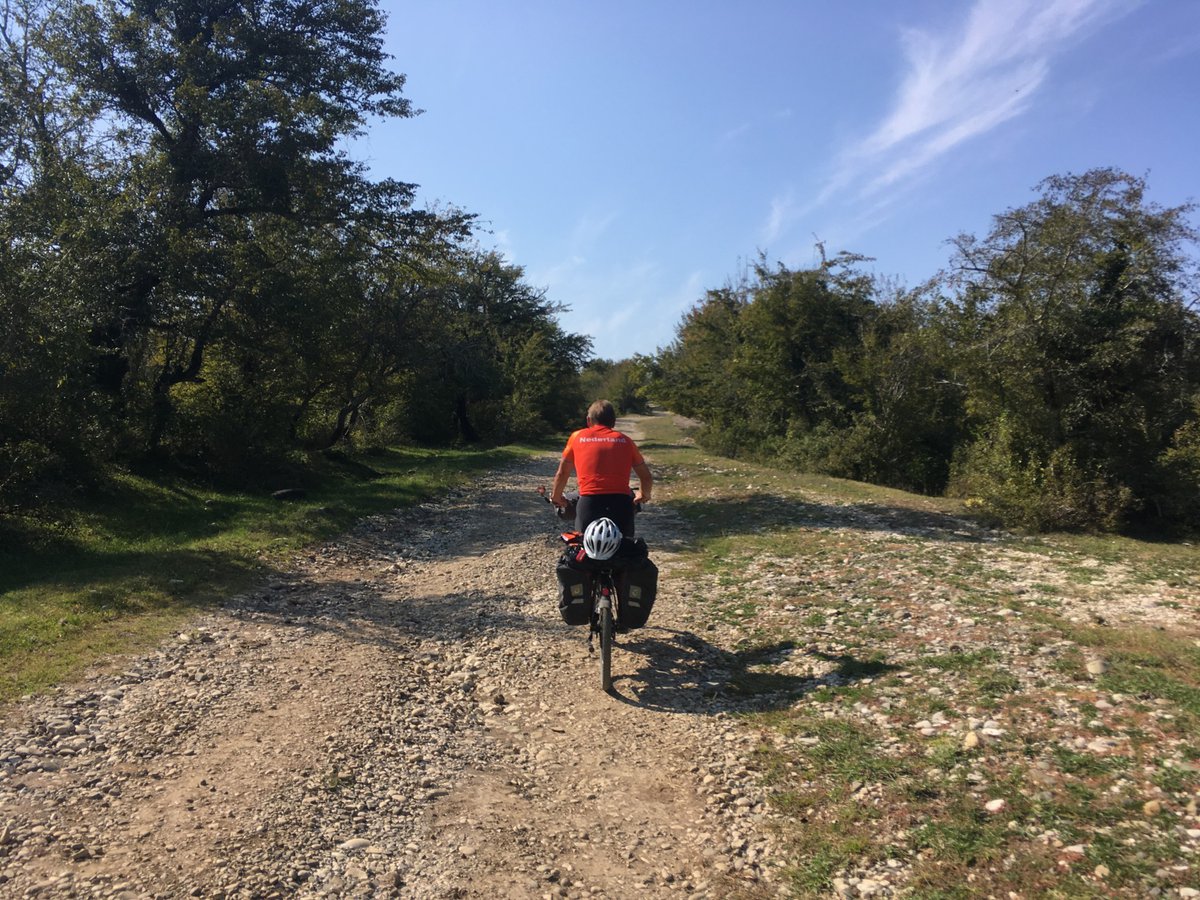
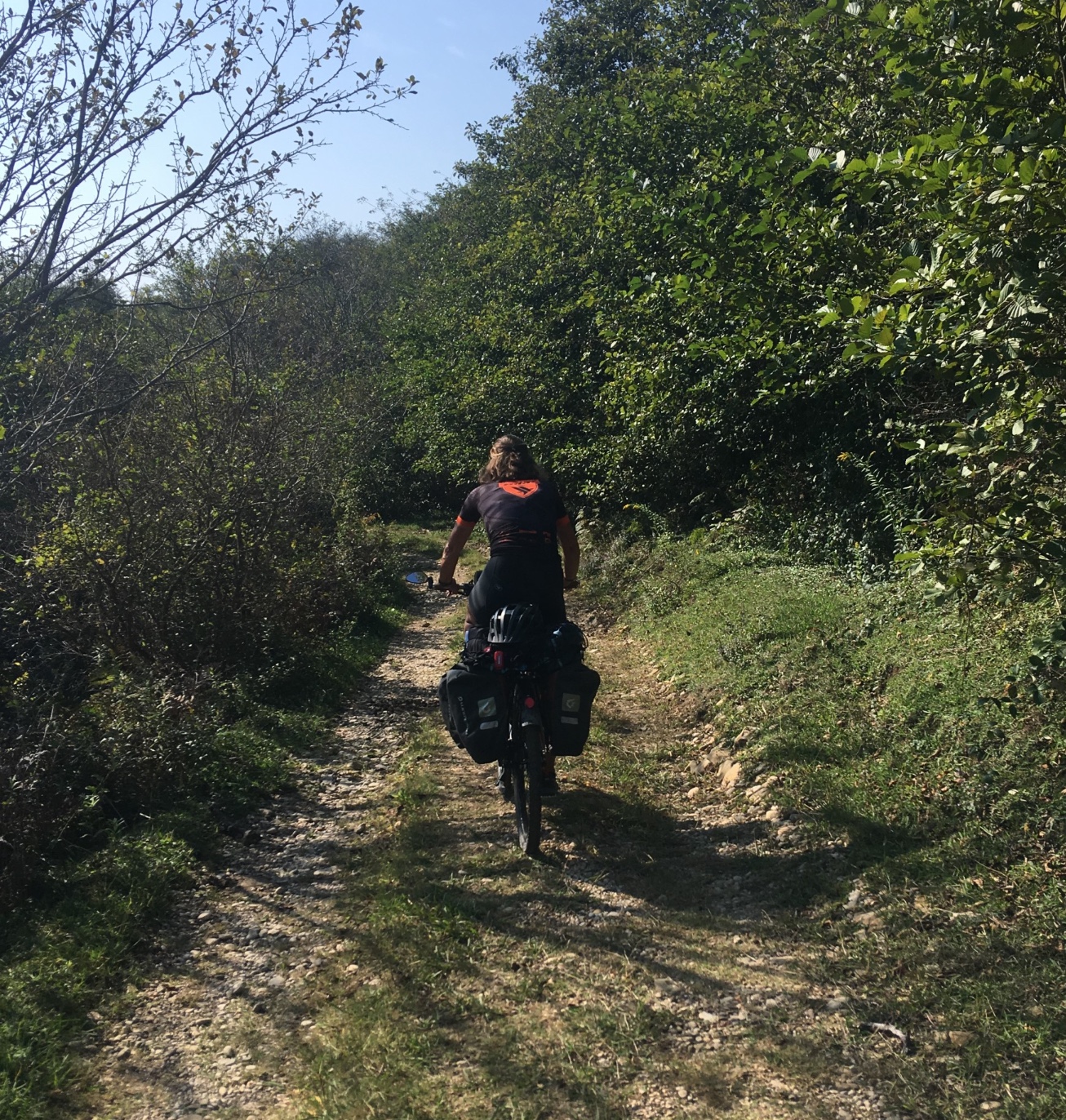
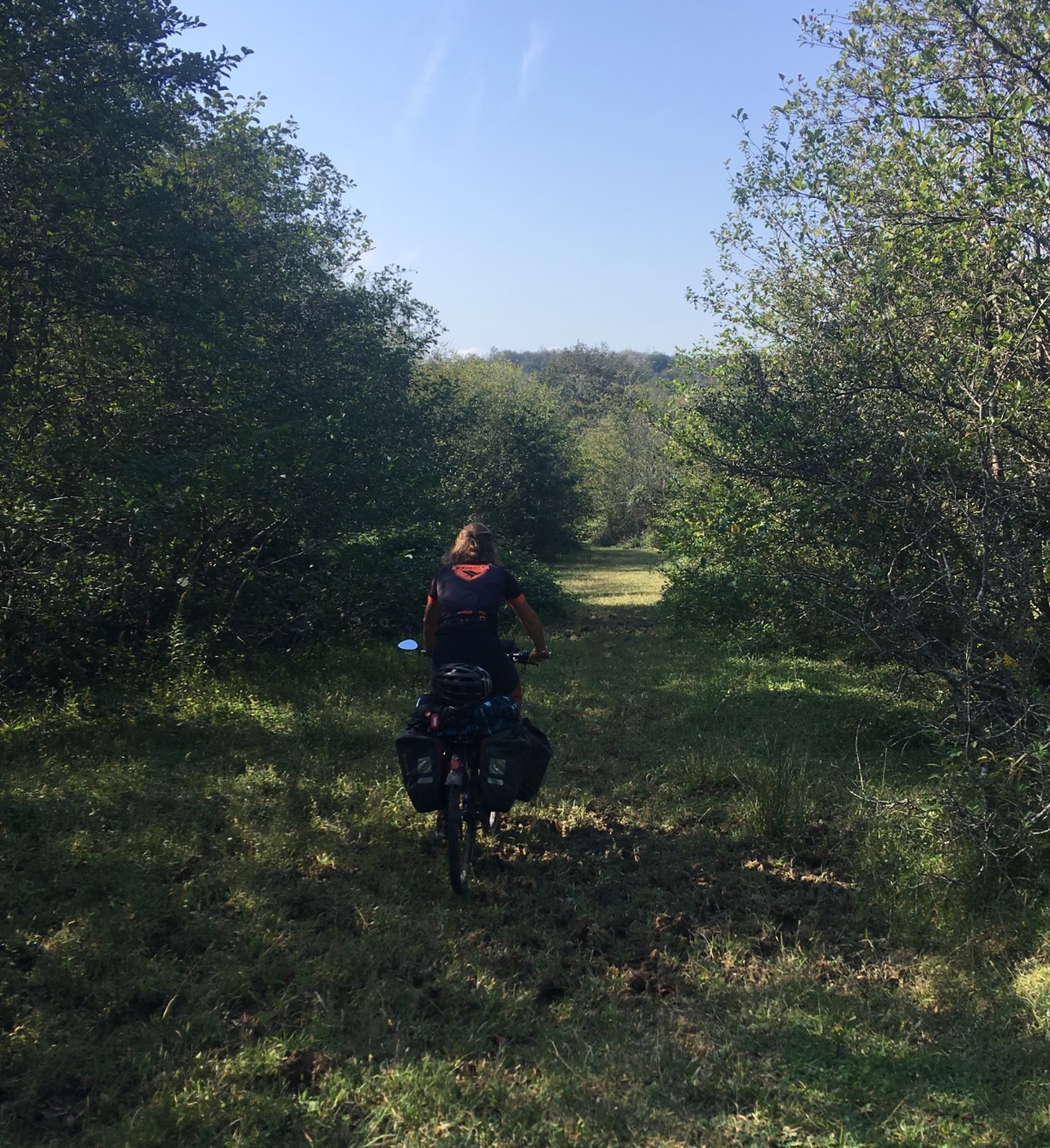
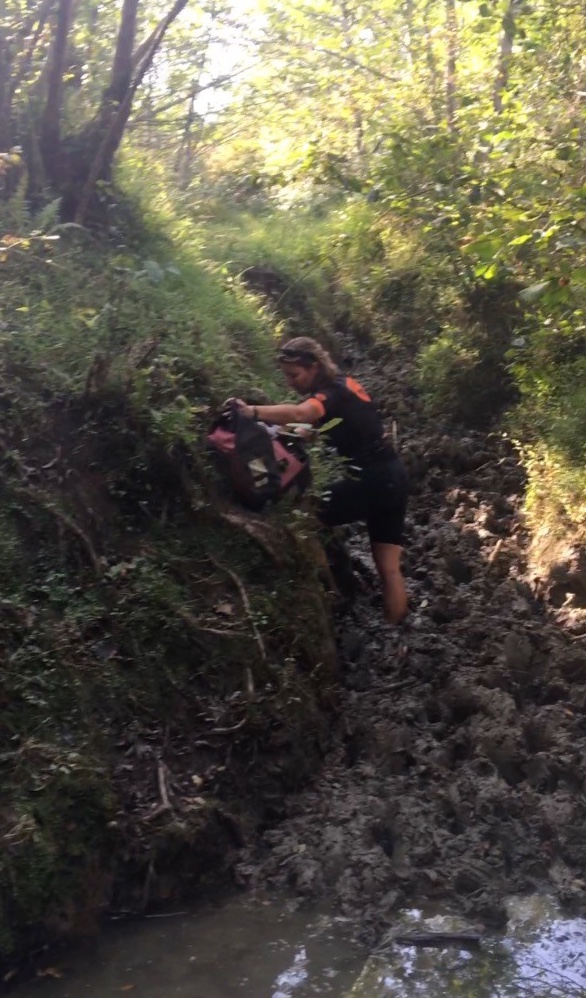
The trail turns fortunately in a little track and here and there there is a farm with angry dogs. Dogs is also a thing in Georgia. Stop, throw stones, scream and then slowly cycle again ..
When we finally arrive at a wider asphalt road, we see that our route wants to send us another unknown terrain and that it is still more than 35 kilometers to Zugdidi. Also because we no longer have water and then have to filter, we decide to cycle to the nearest town of Senaki. Zugdidi can wait another day. On the road we are approached by a mega-aggressive dog. Even the owner can not control the dog and throws stones until the dog walks behind the fence after a long time and she quickly closes the fence.
In Senaki we stop at the gas station to buy water. What can water be delicious! After a round through town we realize that there are not many overnight options. There is a guesthouse on maps.me but when we get to the place there is no sign of a guesthouse. The rescue comes from Ika, a friendly man who speaks English and rings a woman that has the same name as the name of the guest house. She seems to be the owner. Five minutes later we are in the top floor of her house and take a well-deserved hot shower. Afterwards Ika comes to pick us up and takes us in his 4WD Lada to a restaurant, supermarket, ATM and wine shop. In the restaurant we get a crash course on Georgian cuisine, which results in a lavish meal. He also shows us how to cycle out of town the next day before we are dropped at the guesthouse again.
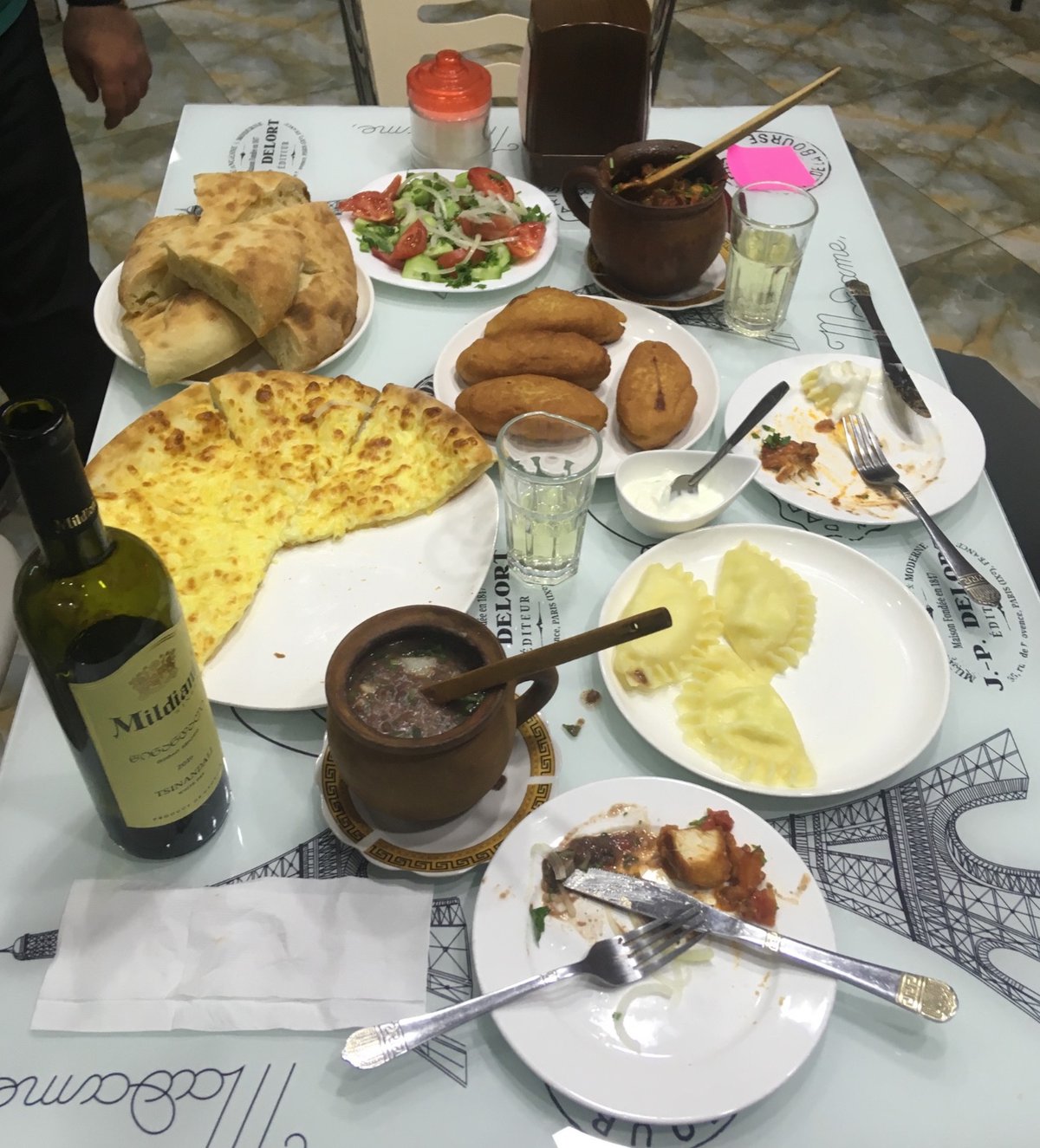
The ride to Zugdidi is short and simple. Along the way we wash the mud of our bikes, bags and shoes and afterwards we have a wonderful afternoon in guesthouse Green House. No hand wash today. The Green House washing machine washes the mud from the clothes. The path yesterday, mentally and physically, made a big deal on us. In restaurant El Barco near our guest house we eat a great meal in the evening. On Facebook we are asked if we are going to cycle Svaneti. Svaneti? No idea. We search on internet and it appears it is the name of the region that we are going to cycle through. So yes, we are going to cycle in Svaneti.
At breakfast the next morning we meet an American Georgian, who tells us something about the (political) situation in the country. For example, about the upcoming elections where the posters of the candidates have been posted everywhere. Our planned route runs alongside or through South Ostetia and that, he says, turns out not to be a good choice. Georgians are not allowed to pass. Perhaps it is possible for tourists because international conflicts are avoided, but his advice is to get around the area.
From the plain of Zugdidi we cycle to the Svanetic capital Mestia in the Caucasus. We do not get there in one day. Back in the mountains we cycle along a large dam. We stop for lunch at the dam. First a car stops with three Dutch boys whom are on a round trip through Armenia and Georgia and a moment later a large touring bus stops with Dutch and Belgian tourists. Georgie appears to be a popular holiday destination currently.
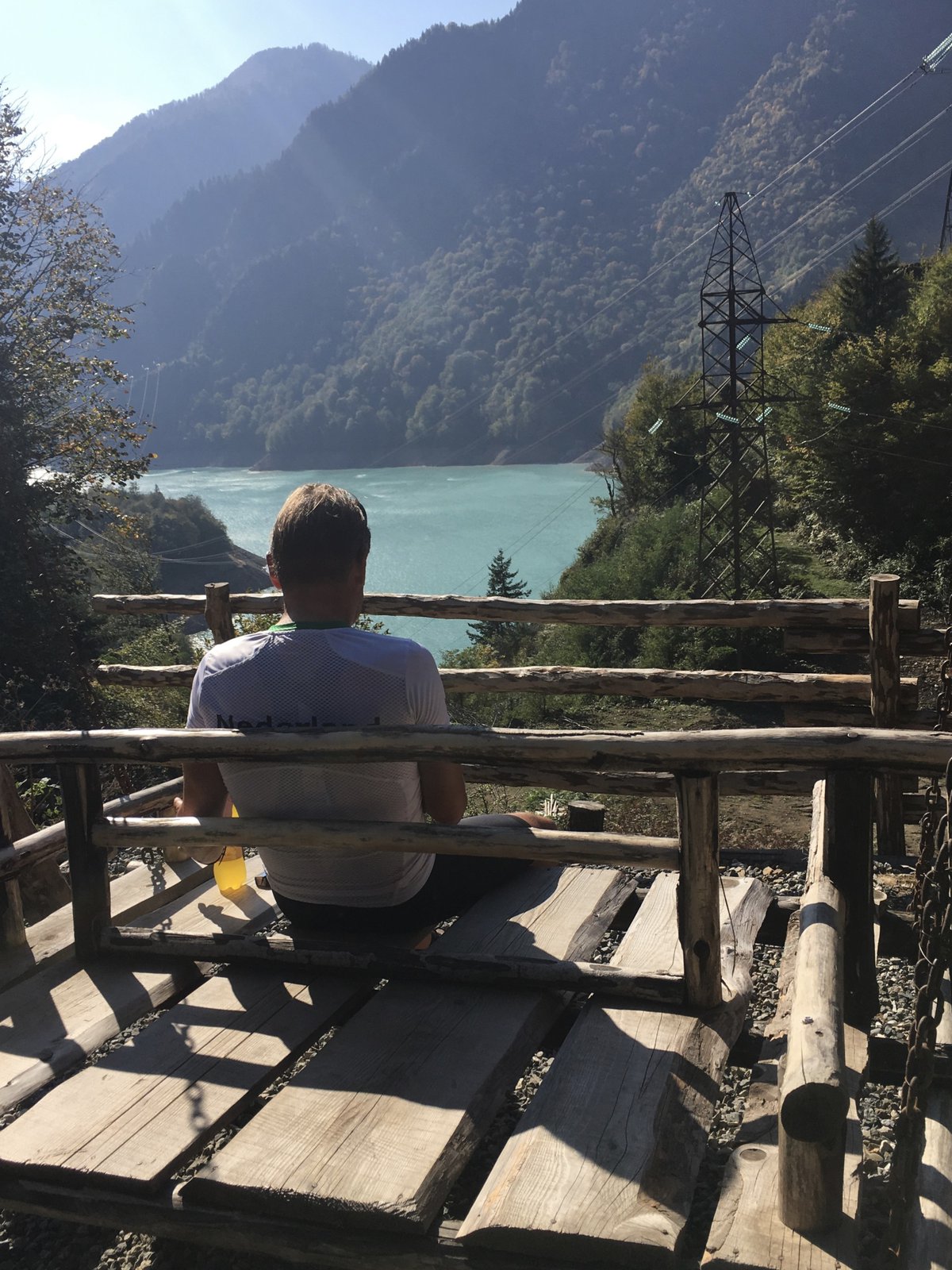
We continue along the reservoir in the direction of Mestia. We stop halfway in the village of Khaishi. There is a sign with a hotel on a façade and we ask for a room. It looks more like a hostel than a hotel. The rooms have 4 single beds. The shared shower and toilet can only be reached via open air. We are the only guests and find it okay to stay here. With a clear reluctance, the hostess is willing to serve breakfast in the morning. According to her the small mini shops would not be open on Sunday morning. They are, but we know that the range is very limited, so we are happy with the breakfast of the ‘hotel’.
The reservoir is already behind us and the road runs along the river up to Mestia. A pack of stray dogs runs around Harry’s bike. Harry brakes to prevent a dog from getting hurt but then his shoe won’t get out of his click and he falls while swearing on the dogs. Without excuses from the doggies, he climbs back on the pedals and continues somewhat irritably his way.
To reach Mestia we cycle 68 kilometers further and 1,100 meters up today. The climb continues steadily along the river into the mountains. Approximately 20 kilometers before Mestia we get company from a dog, that hangs around an abandoned building material depot. We try to shake her off but she gets back with every climb. When we expect a longer descent we stop and give her some bread. She seems to be in despair: company or food, which of the two is most important to her? She chooses the company. First with a piece of bread in the mouth but she gets rid of it for the big chase.
The last 20 kilometers goes up and down the road. At a descent we reach speeds of well over 30 km / h and the dog disappears from sight. We are amazed every time we hear the panting of the dog next to us at the next climb. She is a fuller. In Mestia she plunges down next to us at a terrace and then we can no longer ignore her: we pet her and give her some food. What a sweet dog this is.
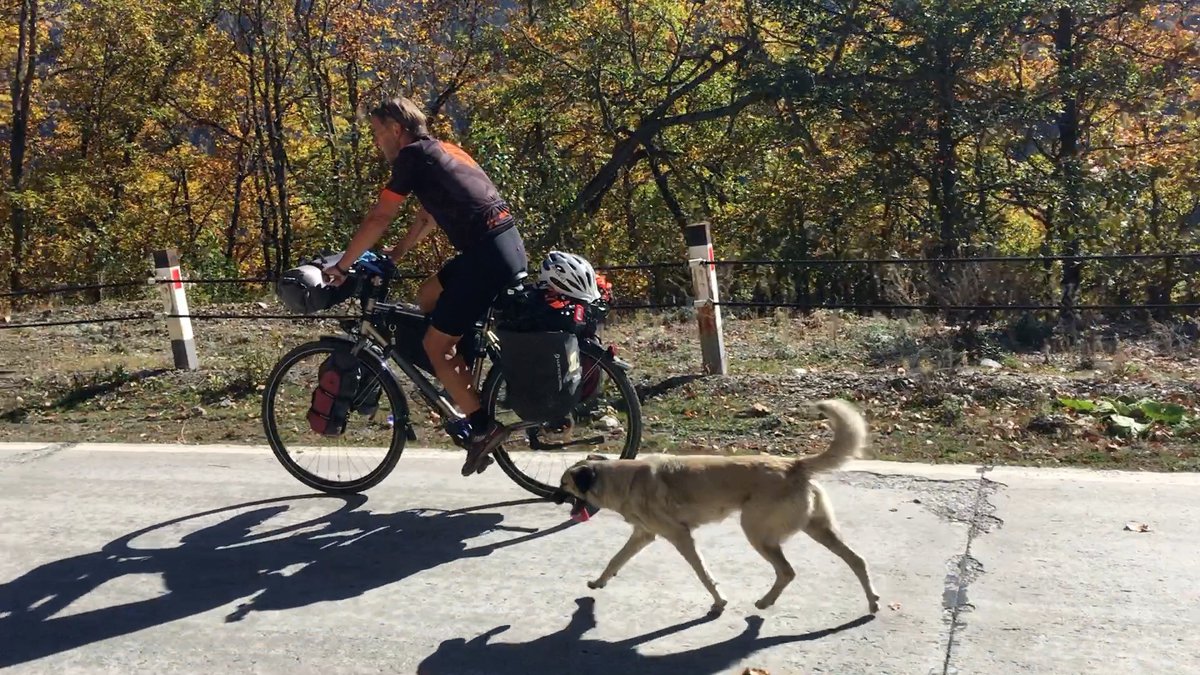
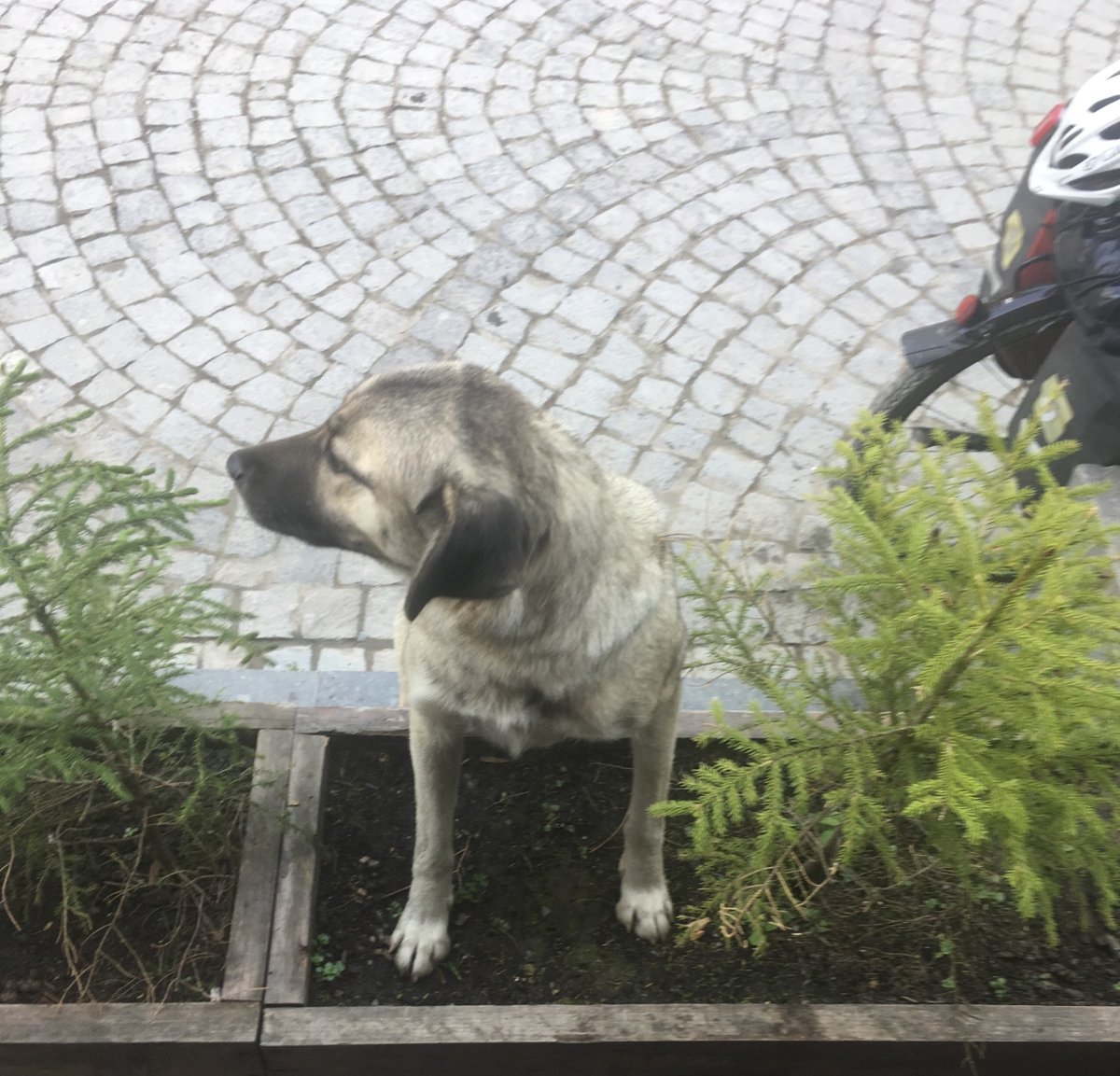
Around Mestia you are surrounded by high snowy peaks. It is buzzing in Mestia. Some people call it a “tourist trap”, but we enjoy this mountain village. Unlike the mountain villages in the Alps, here is still a lot authentic. There are many foreigners, without exception all walkers, but not too many. There are even some ‘campgrounds’, but at this altitude and this time of the year the temperature drops below freezing during the night. We are searching for a place to stay when on the spot where a recommended guesthouse would be we find a nice and cheap hotel. We decide to continue searching for the intended guesthouse and make a round through the center. We pass a popular restaurant with a sunny terrace that is full of returning hikers. Our dog, we named her Hachi, is jumped from all sides by the local village pack and she crawls to hide between our bikes. We keep the other dogs at a distance with a stick and attract the attention of the audience sitting on the terrace. Somewhat surprised we realize that we have started to love Hachi. Yet we know that she can not stay with us, tomorrow’s stage will require too much of her.
Hachi follows us closely to the hotel that we have seen before. The hotel is completely walled and Hachi follows us into the hotel garden. When we return outside freshly showered an hour later, she is waiting for us. We walk to the popular restaurant with Hachi on our side. We go inside because it’s quiet cold. Hachi stays neat outsideThe pack of dogs seem to be approve the newcomer. Besides, it is dinner time and the dogs sit around the terrace to wait if something edible falls on the floor or is thrown at them. During dinner we can see that she seems to have found her place in the begging crowd. We are satisfied that we have taken her to a better place. Inside it is fun when a music group plays traditional Georgian music and there is folkloristic dancing. However, we are exhausted and long for our bed. Hachi follows us back to the hotel garden. Good night!
The next morning it is freezing cold, at night it has frozen. When we get outside we find Hachi rolled up by our bikes. Our hearts are full when she greet us with contagious enthusiasm. What a treasure! Of course she follows our bikes to the restaurant where we have breakfast.
During breakfast we form a plan to let Hachi stay here in this village. She is doing well here, has been accepted by the pack and – however much we would like to – she should not walk with us to Ushguli, 45 kilometers. We take some leftovers from the breakfast where Hachi is waiting for us. We give her something to eat and cycle back to the hotel. There we give her the rest of the bread and quickly close the fence and jump on our bikes. Bye darling! We leave the village a little sad, but we know that this is the best solution for her and for us.
During the ascent to Ushguli we regularly look back to see if that smart girl has escaped the hotelgarden, but after a kilometer or ten we know that the plan worked. We hope that she finds a definitive place in Mestia, full of food-loving tourists …
The first 25 kilometers to Ushguli are fine to cycle. The road is okay and two climbs are not very steep. On the way down we meet two Dutch brothers who drove to Georgia on a VW-bus. We chat a bit and move on. We descend to a village on a river. The river has apparently done rather devastating work, because the road has been completely destroyed. Work is being done to restore the road and the banks of the river. At a store in a container of no more than 5 square meters we try to buy some stuff for the last stretch up, and end up with only a packet of cookies. We are approached by a Belgian couple in a rented 4×4 car. They visited Ushguli a few days before by minibus and warn us of the deplorable state of the road: the paved part has been knocked down in many places and the unpaved part is full of mud. They had not dared to do drive thus road with their rented 4WD car. Okay then…
With 20 kilometers to go we will encounter the last hamlet for Ushguli. Here also stops the ‘paved’ road that is still being worked on and the serious climb starts. We stop at a small roadside restaurant for a strengthening cola and Kubdari, a sort of bread with greasy meat in between. We see a small female dog on the other side of the fast-flowing river trying hard to avoid the ‘amorous advances’ of a 3 times bigger male. Eventually she jumps into the river and is immediately entrained by the current. A hundred meters further downstream she manages to reach the other side and walks in our direction. The male continues to doubt whether he will pursue. The female dog has reached the restaurant and seems relieved that she got away from her far too big lover. But a little later the dog pops up; he also made the crossing and immediately resumes his compelling attempts to mate with her. His arrival has not gone unnoticed by the three other male dogs of the restaurant and they indicate that he is on their territory and must scratch. Two of the three are little mutts. The third, however, is an even bigger dog that is very similar to the Caucasian shepherd. The amorous dog is not be chased away and sticks to ‘his’ love. What follows is a terrible fight between the two big dogs. The amorous male is somewhat smaller but younger and apparently comes out unharmed and resumes his lovemaking game. The bigger male of the restaurant droops limply and pulls back to lick his wounds. The female dog tries to position herself between our bikes in order to get off the crawl on her back.
We continue our route and are immediately abused by the female dog as a barrier between her and the male. That’s not handy: she walks in front and around our bikes while the male keeps his nose on her ass. Harry has already falen once, we don’t want to fall again. We stop and throw water from our bidons on the dogs, we throw stones, kick them and threaten to hit them with a stick. Nothing helps. Every time we start cycling again, the female walks next to or in front of us with the male on her heels. After a few kilometers it seems that the female understands that she should not walk in front of the bike and we give up our attempts to get rid of the dogs. We have company again.
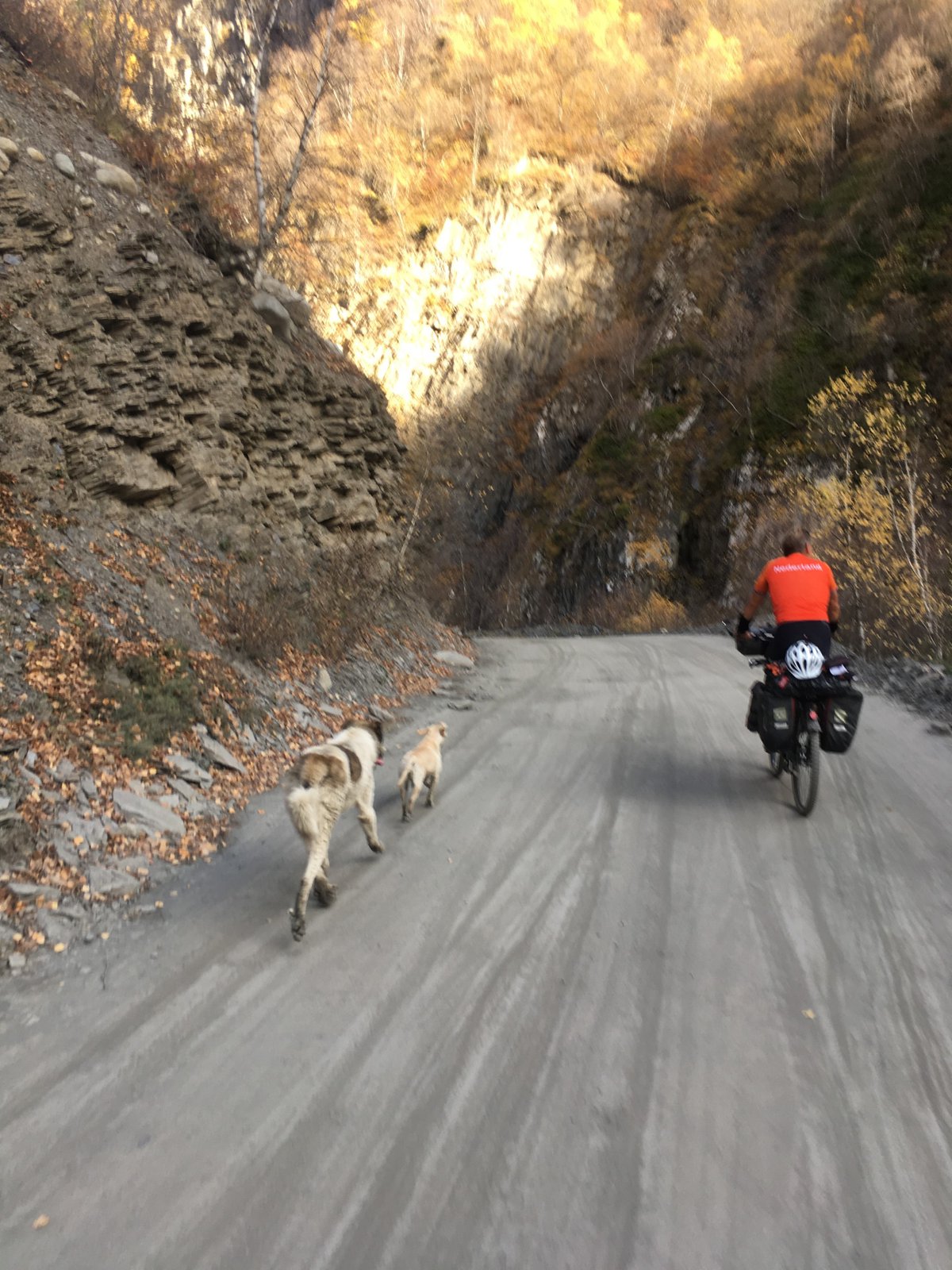
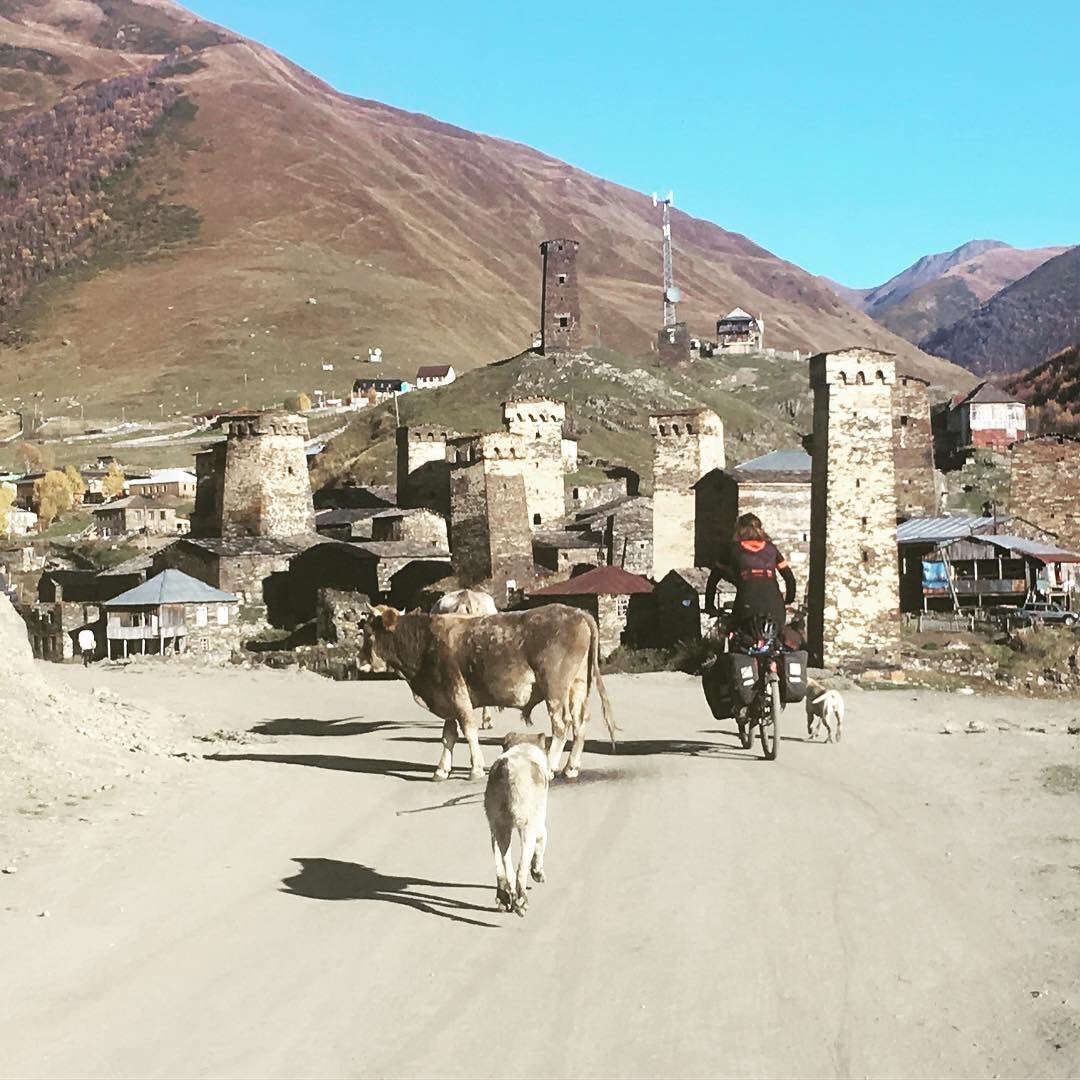
That is how the four of us enter Ushguli. The village consists of five small centers characterized by tower houses. It looks very nice and very old. The village is much more authentic than Mestia and much smaller. Here you do not see any new buildings (yet). We sit down on a terrace at an ini-mini market and pull a beer from the fridge. Our four-legged friends squeeze through the fence and come to lie with us. They are tired and the female dog is finally left alone by the big male. He did not pay us any attentions (only the female dog), but now he comes to sit with us and want some affection. He earned some and we cuddle through his thick fur, until our hands get greasy and black. We would like to see more of the glacier and the mountain massif that is located just a short walking distance from the village. It is already late, so we decide to stay in Ushguli an extra day and look for a guest house. Between the pigs, cows and their excrement, we push our bikes through the narrow paths of the village.
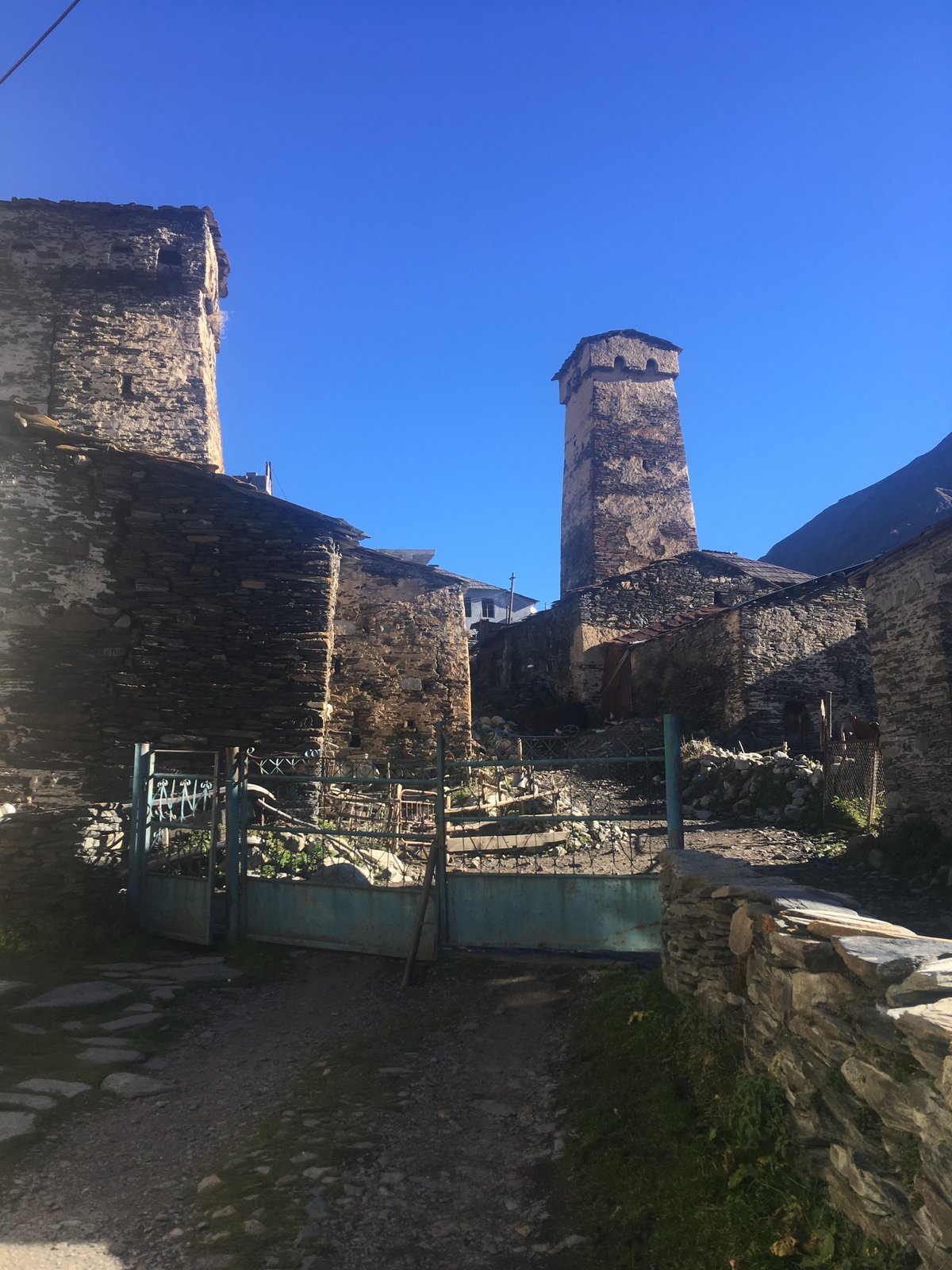
In the first guest house we are shown a room without a window and we turn it down. The hostess takes us to a friend who lives next door and also runs a guest house. There are two tourists who approached us this morning in Mestia. He cycled the same route 7 years ago in the opposite direction as part of his journey from China to Europe. We would like to hear more of their stories and accept a room with dinner and breakfast in this guesthouse. At 7 PM we sit down with Graydon and Terry. The food is as great as the many stories of those two are even better. Graydon is originally Canadian (and son of a Dutch immigrant and also speaks a little Dutch) and his wife Terry is originally from New Zealand. They have recently moved to Tbilisi and travelled and lived all around the world. There is no end to their super interesting stories.
The next day we walk to the glacier. It is a walk of 8 kilometers and the route back is just reversing. Besides the female and male dog, a third dog walks along. The glacier is beautiful and the mountain range with the Shkhara of 5,201 meters high, is majestic. Right after the turning point we meet an Italian couple who apparently met “our” dogs last night. We have not fallen in love with these dogs and we are happy that the dogs choose to join the Italian couple. Without dogs we walk back to the village. We notice that we also use other muscles with walking as with cycling. Especially with Harry “creaks” it. If we want to walk the Annapurna trail in a week or two in Nepal, maybe we need some more training …
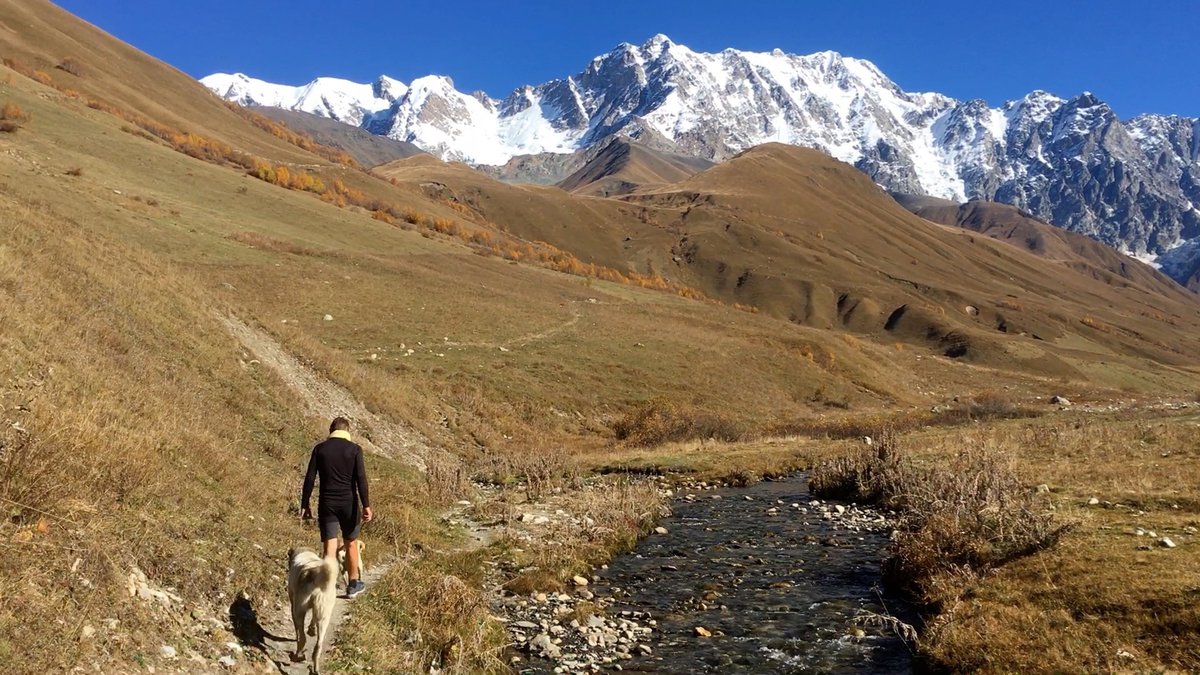
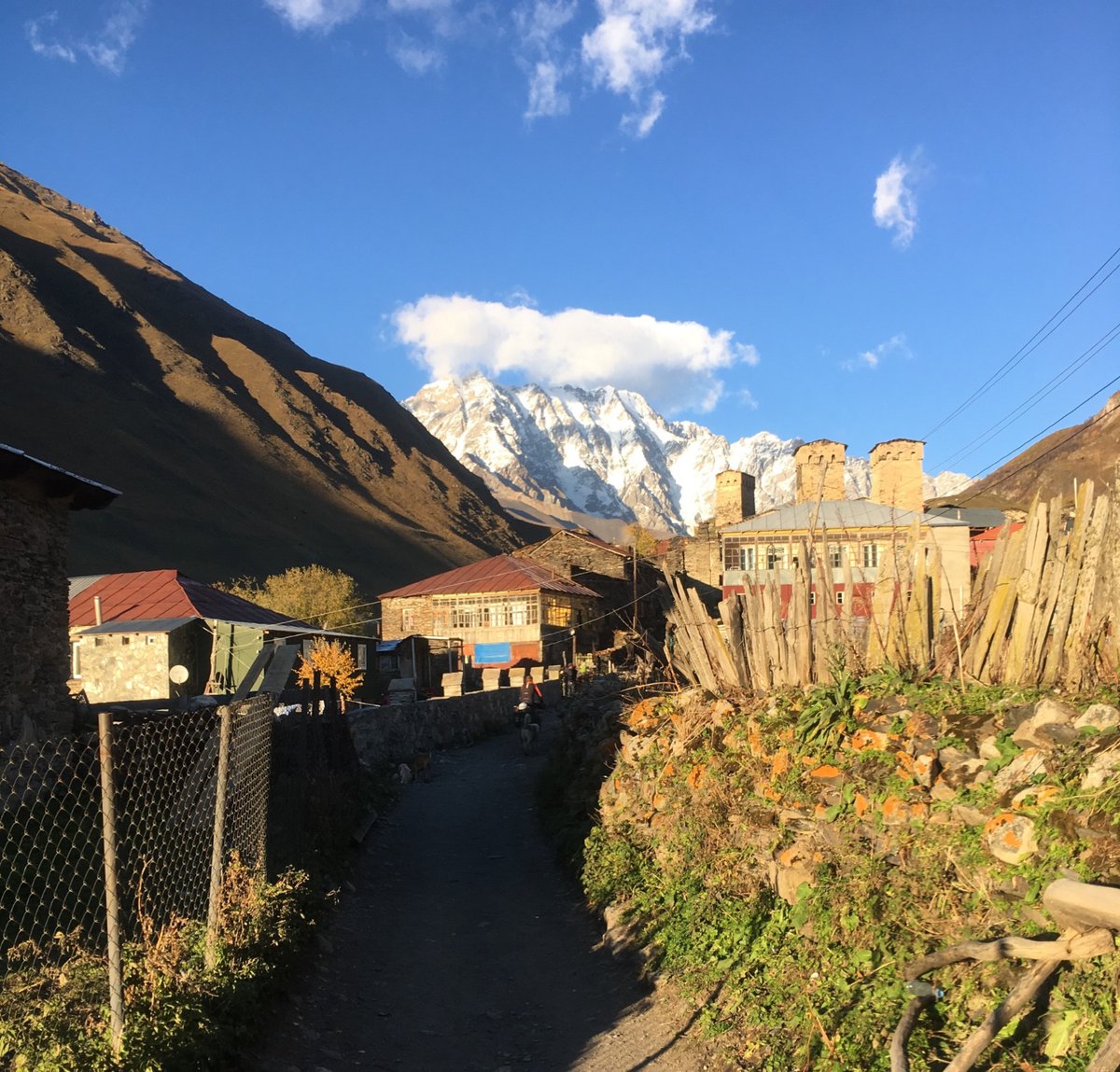
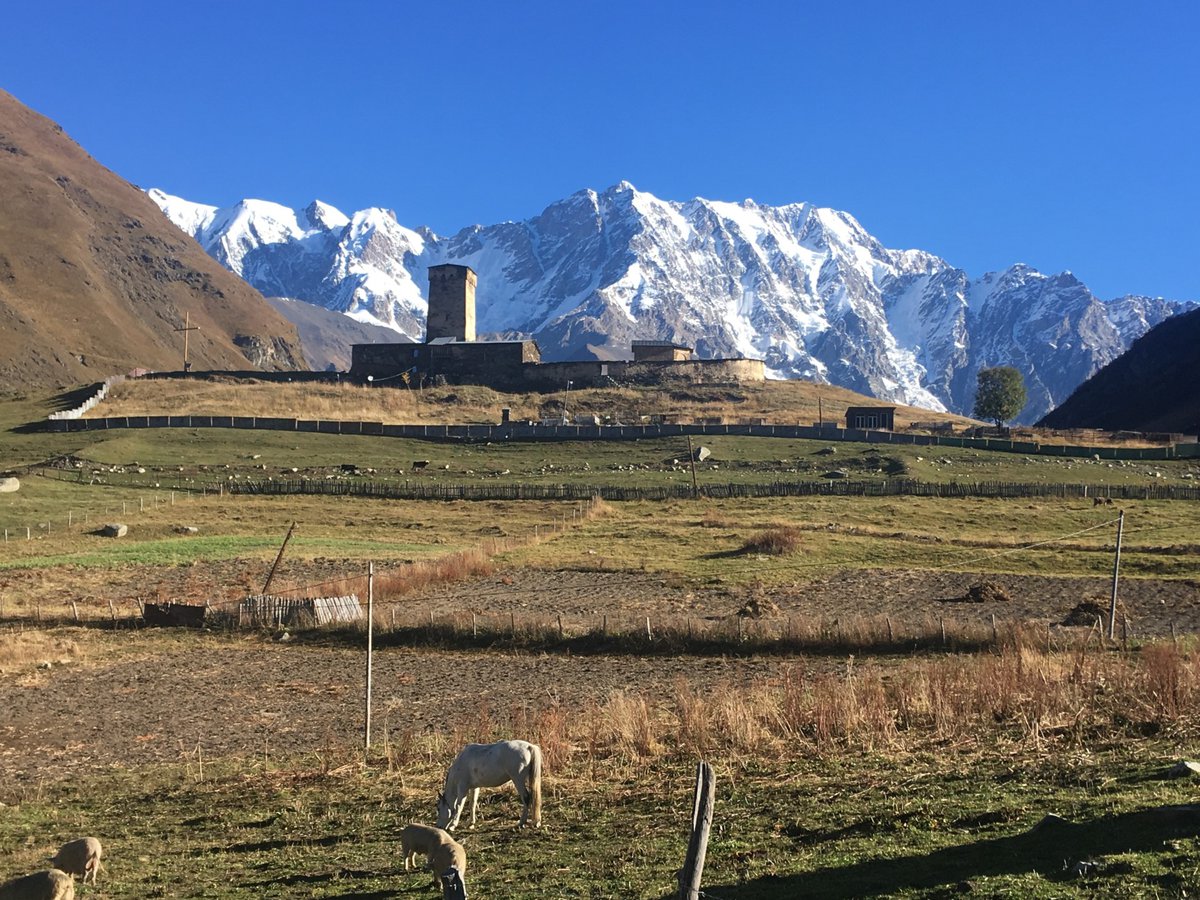
Later in the afternoon we buy a homemade red wine in a PET bottle and enjoy this wine with another delicious meal in our guesthouse. The next morning we resume our journey through the Caucasus, after a real cyclist breakfast with spaghetti. First we have to climb more than 500 meters to the pass, 9 kilometers ahead. At the border of the village we see Anton, a bike packer from Belarus. We have seen him twice before, in Khaishi and in Mestia, but have not yet spoken to him. Now we finally meet and cycle together to the pass. On top again no sign with height, but on the internet it is found that the top is at 2.609 meters. We take photos of each other and exchange Instagram addresses.
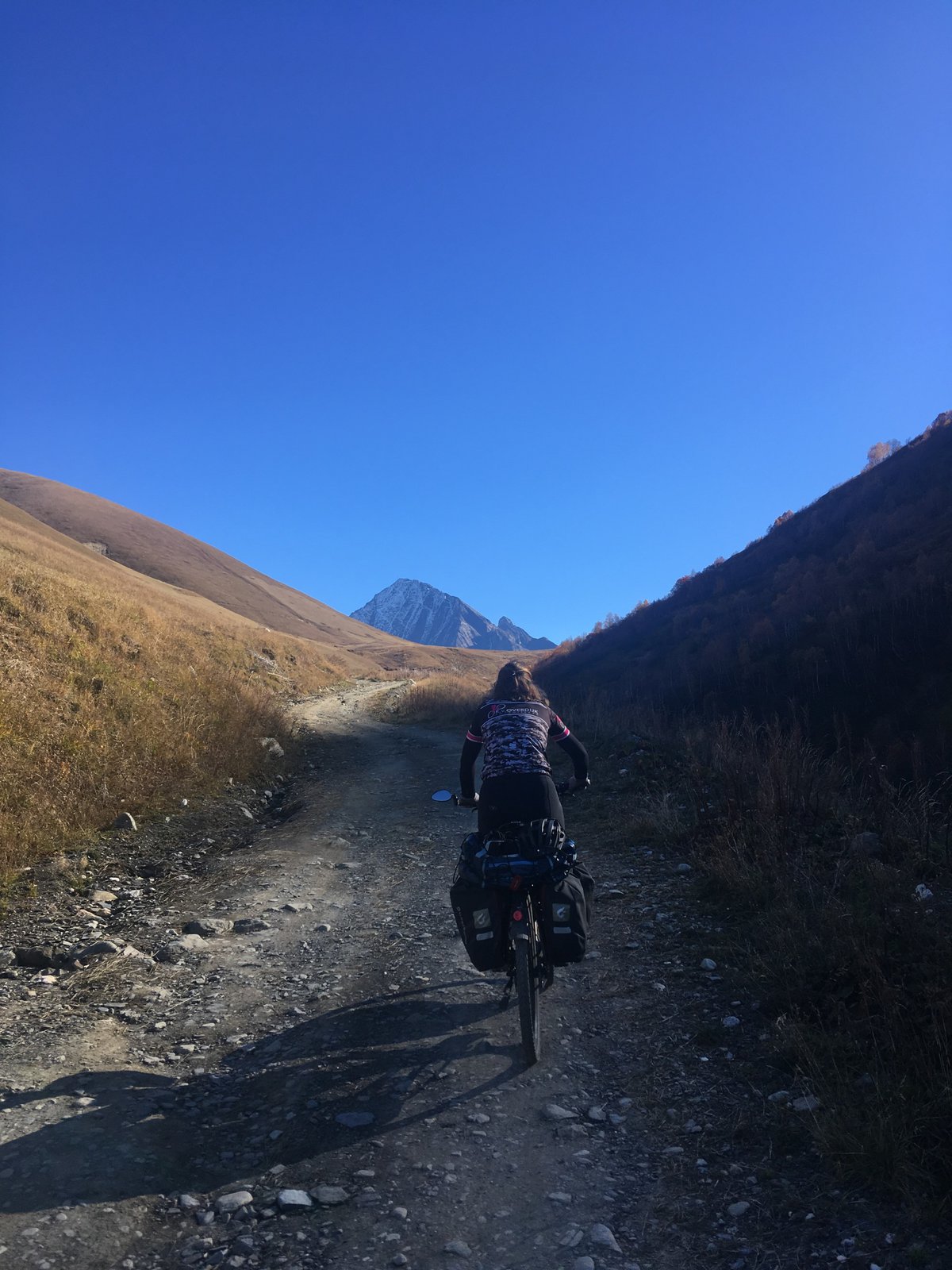
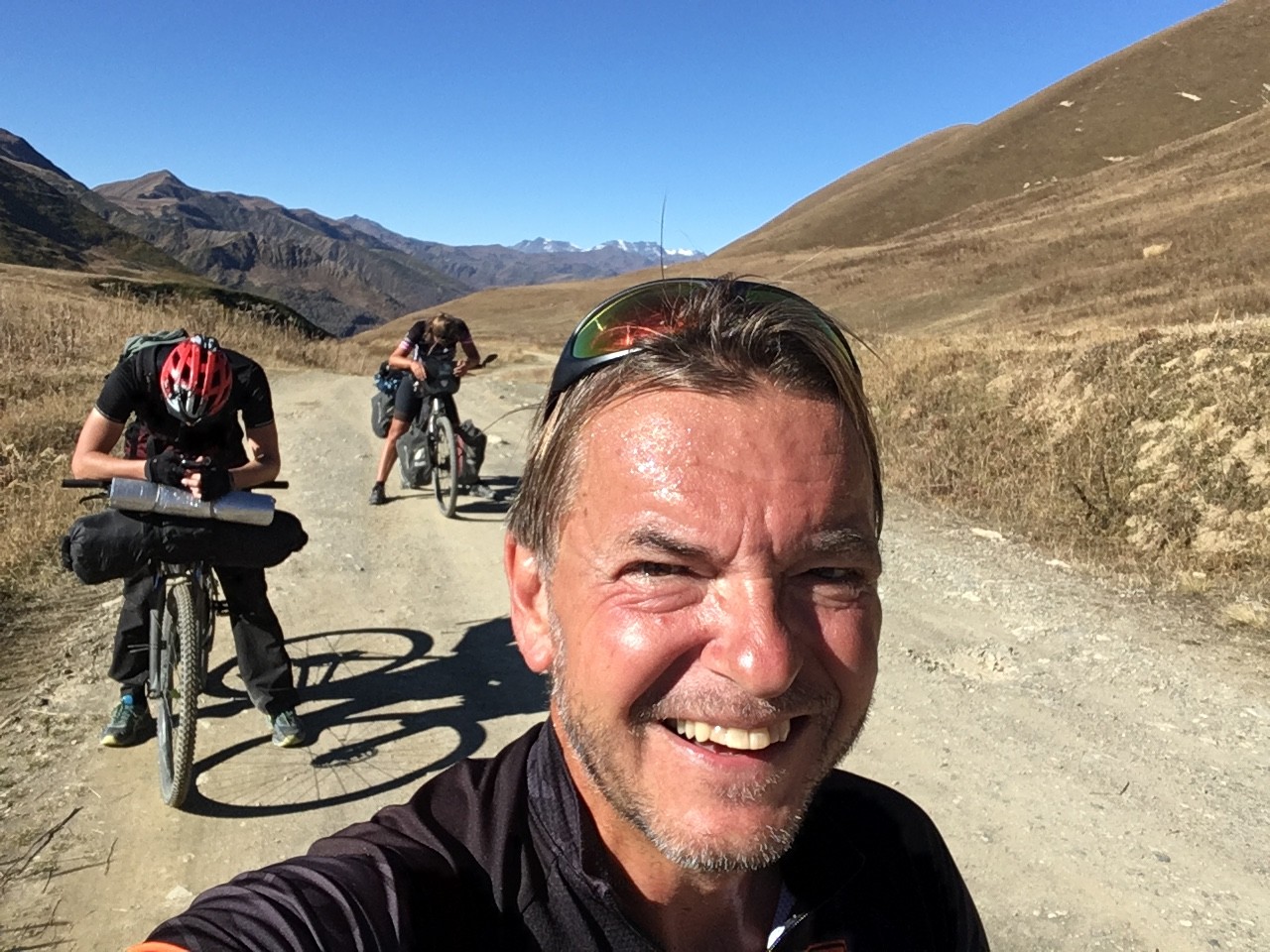
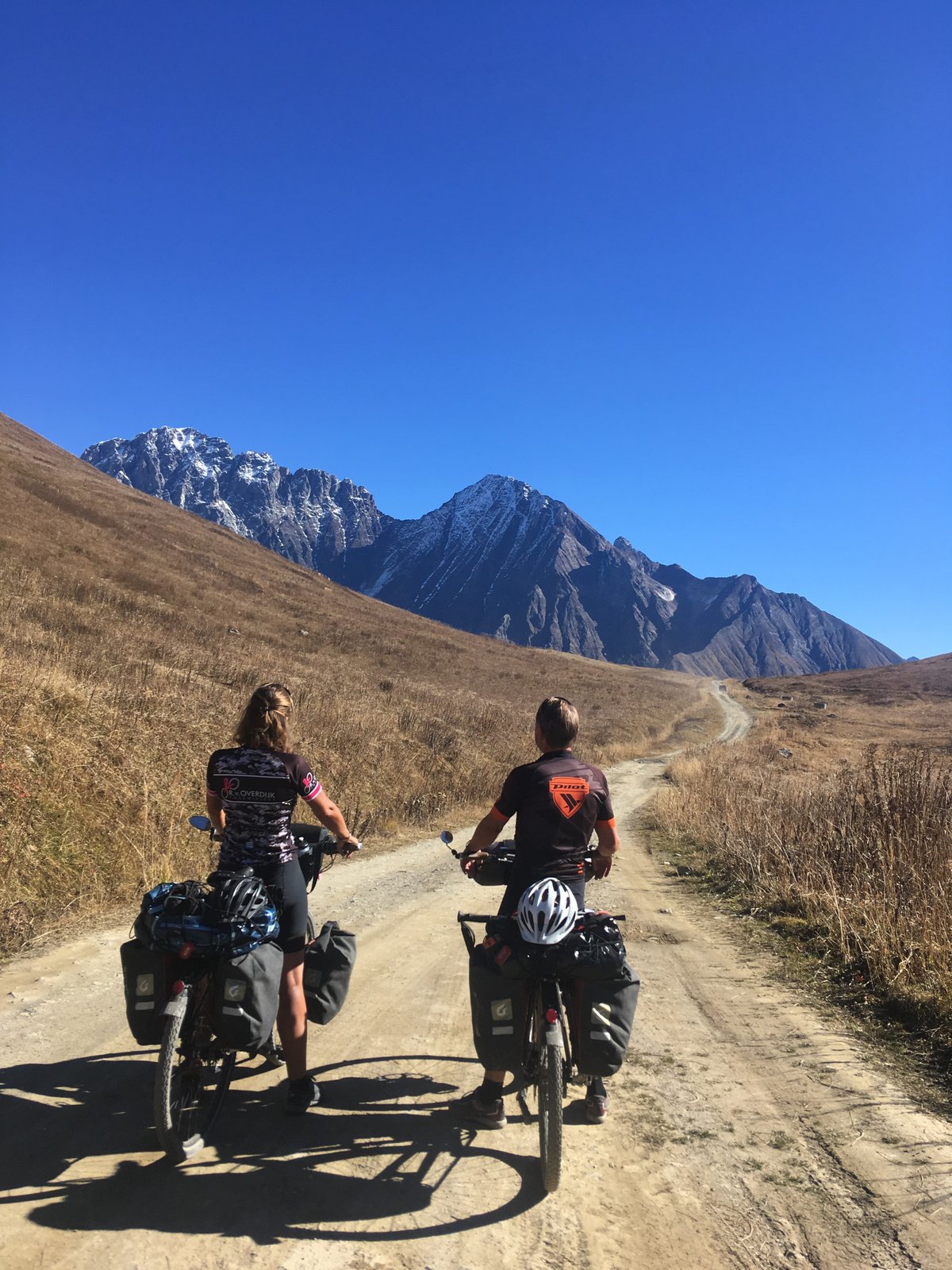
What follows is a crazy descent, in which Anton can clearly handle more speed on his minimally packed MTB. After a while we say goodbye to each other (but until Kutaisi we see him again several times). The descent requires the utmost of us and our bikes. Mud (puddles), deep channels, running water, rocky stones and loose boulders combined with very steep ascent, make it an almost perilous undertaking. Below the water surface of the mud pools you can not see how deep it is and where the boulders are. Roelie chooses the wrong track once, does not get out of her clicks and takes a mud bath. Wet and full of mud she continues her way.
Although the descent is steep, we rarely exceed 10 km / h and we progress slowly. We have deep respect for those who have climbed the pass from this side! After an hour we reach the first hamlet and we hope that the road gets better, which unfortunately is not the case. The road is at most less rocky, but muddy and wetter. On the way Roelie loses her sneakers that were still drying from the rinse after the hike of yesterday under the net of her luggage carrier. Regrettable because she wanted to hike the Annapurna circuit on those sneakers. Cycling back and searching is not an option!
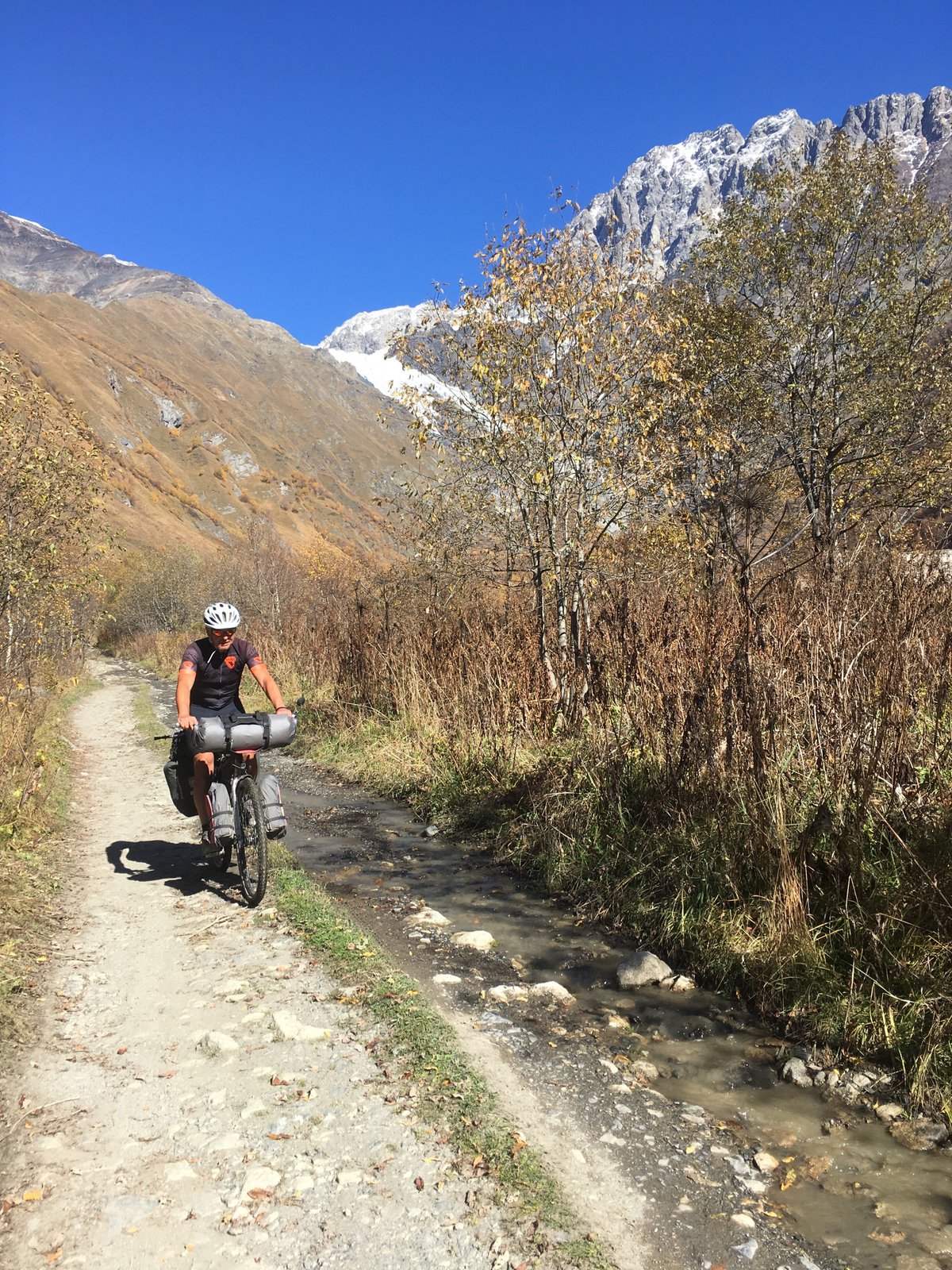
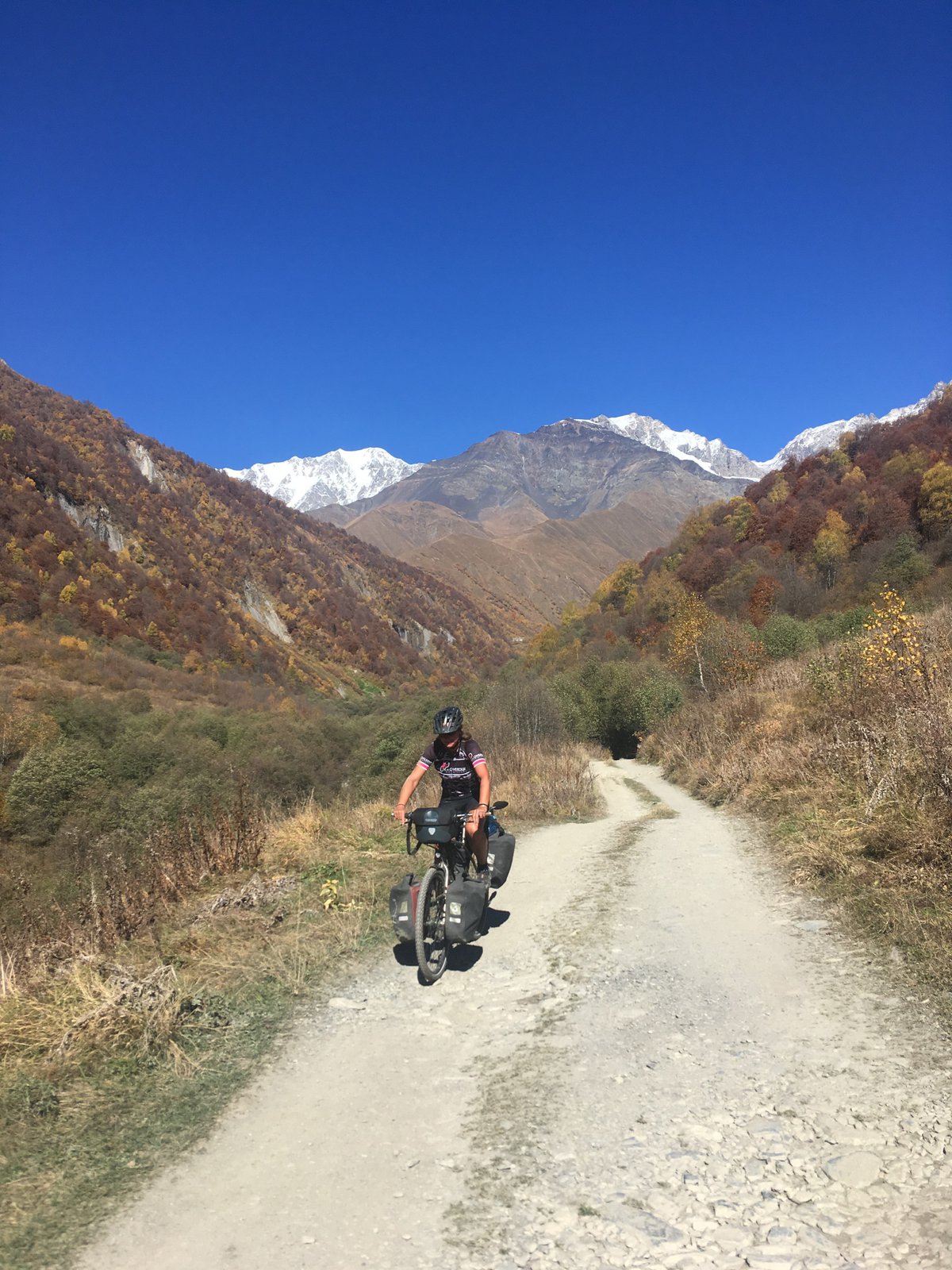
Another time later we pass through a village where is being worked on the road. We order a coke and a Snickers from a lady who runs a shop and desperately tries to sell her 10 other products. She asks a ridiculous high price for the coke. But we would like to relax in her garden and accept the fact that we are being a bit scammed. After the village the road is generally asphalted, although it is regularly alternated by muddy parts. The road follows the river, but often we need to get up higher on the mountain slope, when the valley becomes too narrow and that means climbing again. It is late when we arrive in the village of Lentekhi. We have set our sights on the guest house Konstanta were we are enthusiastically greeted by the owners. After a warm shower we are served the tastiest Kubdari (the meat filled bread) that we have eaten in Georgia so far. We order a red wine from their own garden in (again) a PET bottle. It tastes delicious, but we also think that the alcohol percentage of this wine is higher than usual for red wine. We do not have any trouble to sleep when we go to bed at 8 o’clock.
We have agreed with the hospitable owner to have breakfast early, because we have a tough stage to get to Kutaisi of about 90 kilometers. Even though this city lies a few hundred meters lower, the altitude profile shows a lot of rollers and a few vicious bumps. It has frozen that night and we are warmly dressed after a extensive breakfast and take off.
The road runs another 50 kilometers along the river which we already followed for 70 kilometers and saw as a mountain stream. We need to exchange the valley of the river for an adjacent valley to get to Kutaisi. Some climbing gets us there. Up to 8 kilometers before Kutaisi, which is located in the plain, we keep a view of the snowy peaks of the Caucasus. With some melancholy we descend to the city. What a great beautiful area we have been in these last days!
In Kutaisi we return to the fine guest house where we have stayed before. We permit ourselves a little luxury. We first clean our bikes, bags and shoes at the guest house. Everything is covered in mud. In the evening, Ivan is visiting us. This cycling Englishman and former truck driver was our guest last May through Warmshowers.org. He then had just started his bike journey via Prague to Athens. That was his destiny to return home, but he decided to continue cycling and arrived in Kutaisi today. We exchange stories and tell him about our adventures of the past days in the Caucasus. Ivan doubts whether he wants to start it or perhaps cycle with us towards Tbilisi. The next morning he sends a message saying that he, too, is heading to the Svaneti mountains. Good choice, Ivan! We stay a extra day in Kutaisi to prepare ourselves for the last stretch of our route through Georgia: up to Tbilisi.
